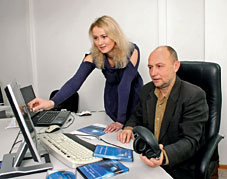 By Nikolay Dorofeev
By Nikolay Dorofeev
Last spring, Georgia’s Union of the Blind held talks in Minsk, after failing to find a software developer ready to fulfil an order for a modest sum of money. However, in autumn, the new software was cheered at its presentation in Tbilisi.
“We’ve provided the customer with the beta-version, for preliminary acquaintance. This is an almost finished programme which we’ll complete in just a few weeks,” explains Sakrament IT’s founder, Valery Yegorov. “The software envisages such functions as changing text reading speed, the use of intonation, and the possibility of adding new words to the user dictionary of stresses. The development of our speech synthesiser has been conducted with the participation of specialists from Minsk’s State Linguistic University. Previously, we created a similar order for Lithuania; now, we’re negotiating with Kazakhstan and Romania.”
Interestingly, programmers don’t need to know all the nuances of the language — be it Georgian, Lithuanian or another — as they apply compiled synthesis, using native-speakers as voice donors. Texts pronounced by professional speakers are decompounded by the software into allophones (sound ‘bricks’ used by the synthesiser to construct voiced words for any printed text existing in an electronic form).
Not only the blind use such synthesisers. The Belarusian IT company is a global leader in the field of software development for the distinguishing and synthesis of Russian and English speech. It is used in information-reference services, alarm, security and screen access systems, in addition to mobile applications (to establish a speech interface).











